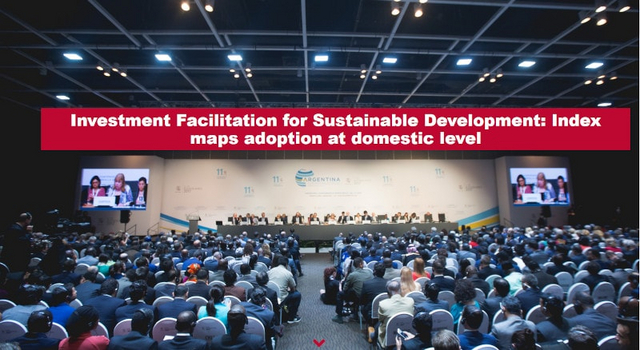Substantial progress on Investment Facilitation Framework for Development
Substantial progress in WTO negotiations on Investment Facilitation Framework for Development, but challenges remain
Press Release of 15 December 2020
Geneva - World Trade Organization negotiators wrapped up the year with substantial progress in negotiating a multilateral Investment Facilitation Framework for Development. This was revealed at a public workshop on 11 December 2020, organized by the International Trade Centre (ITC) and the German Development Institute / Deutsches Institut für Entwicklungspolitik (DIE) as part of an investment-for-development project.
High-level representatives from around the world spoke at the workshop. They expressed their satisfaction with the progress of three years of discussions and negotiations.
Looking forward to the WTO’s Twelfth Ministerial Conference in 2021 (MC12), Ambassador-designate Mathias Francke of Chile, the coordinator of the negotiations, identified as one of the challenges facing negotiators “to reach an ambitious and concrete outcome by MC12 — this is a goal repeated by all participants”.
Speakers pointed out that arriving at a Framework is vital because increasing investment, including foreign direct investment (FDI), is central to relaunching economic activity after the COVID-19 pandemic.
Nigeria’s Minister of Industry, Trade and Investment, Otunba Richard Adeniyi Adebayo, expressed his conviction in a statement that: “We are confident that the Joint Statement Initiative on Investment Facilitation for Development will most certainly generate unambiguous economic benefits for us.”
Ambassador Usha Chandnee Dwarka-Canabady of Mauritius said that a multilateral framework “can be a great vector for reform.”
Hiddo Houben, Deputy Head of Delegation of the European Union to the WTO, said: “I would like to flag that the current pandemic is likely to increase the case and the validity of this WTO initiative… As countries will be seeking to emerge out of the pandemic, it will be even more important to see investment as a key driver for the fastest possible recovery... We should look for concrete outcomes by MC12”.
WTO Deputy Director-General Yi Xiaozhun said that successfully concluding the negotiations would signal that the Organization can deliver concrete results of benefit to its Members.
“The progress of the initiative so far proves once again that Members can find in the WTO an adequate platform to negotiate rules – rules that will promote the expansion of trade and investment, and hence development,” he said.
While 106 WTO Members currently participate in the negotiations, Ambassador Zhang Xiangchen of China said: “No one in the WTO will be left behind.”
“We need to do more outreach. For example, the workshops of ITC and DIE are extremely valuable in terms of providing a neutral platform for Members to address concerns and ask questions. We need additional developing Members’ contribution in these negotiations. We need to continue our efforts to bring additional Members on board and take their needs into account,” he added.
Views in the negotiations are converging, to different degrees, on several concrete investment-facilitation measures to increase transparency, streamlining and speeding up authorization procedures and developing mechanisms to enhance domestic and international coordination and cooperation on investment facilitation.
Such concrete measures include, for example, the publication of investment-related laws, regulations, procedures and information of interest to potential investors, as well as opportunities to comment on proposed measures; clear procedures for administrative actions (including time-frames), as well as information on fees and charges; and the establishment of contact and inquiry points, as well as encouraging domestic regulatory coherence.
Encouraging the observance of corporate social responsibility (CSR) commitments — and, broader, responsible business conduct — seems to be gaining traction.
Ambassador Luiz Cesar Gasser of Brazil said: “We see CSR as a main component of the initiative, it is very sensitive, we need to bring business on board.”
Issues that require further negotiations include:
- concrete commitments regarding technical assistance and capacity building
- provisions regarding the specific nature of special and differential treatment for developing countries
- the degree of flexibility with which commitments can be implemented
- the nature of sustainable FDI provisions
- how a Framework can be insulated from international investment agreements
- the function of a WTO Committee on Investment Facilitation.
Ambassador Grata Endah Werdaningtyas of Indonesia said: “We are encouraged to see the common understanding on the need to build a firewall between a multilateral framework and other international investment treaties.”
The ITC-DIE project supports the negotiations through capacity building of especially negotiators from developing countries. It brings the ground-level experience of investment promotion agencies, international investors and other stakeholders, and analytical input from academic experts, to negotiators’ attention.
The results of more than a dozen consultations are available here: http://www.intracen.org/itc/Investment-Facilitation-for-Development/, including a summary that synthesizes what has been learned so far. ITC and DIE stand ready to further support negotiators through capacity building.
Contact
German Development Institute / Deutsches Institut für Entwicklungspolitik (DIE)
Axel Berger
Senior Researcher, Research programme “Transformation of Economic and Social Systems”
E-Mail axel.berger@idos-research.de
Telefon +49 (0)228 94927-247
Fax +49 (0)228 94927-130
International Trade Center (ITC)
Vittorio Cammarota
Chief, Communications and Events
E-Mail vcammarota@intracen.org
Telefon +41 22 730 0322


